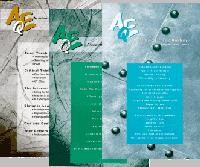Heralding the Dawn of the Information Age

Academic Exchange Quarterly
The following article was published in the Academic Exchange Quarterly during my tenure with the journal as copy editor. Publication information is listed at the end of the essay.
One of the commonplaces of modern society is the personal ownership of books. A visitor to America would be hard pressed to find an American household without at least one book. In addition, there are newspapers and magazines for every interest. We are inundated in print.
The printing press revolutionized the world by providing a means for the storage and dissemination of writing so that scholars could share their findings and explore the riches of past thought. Legend has it that John Milton lost his eyesight because he locked himself away with the aim of reading all that had ever been written. Public education was founded to provide a literate citizenry, and university education expanded beyond the accumulation of a personal collection of handwritten texts. The printing press created its own privileged realm of writers, publishers, editors, book sellers, and critics who create, disseminate, and evaluate this universe of writing.
In many ways the Internet is the democritization of that process. Now anyone can publish his or her work, and publish it, not just for a close coterie of friends and acquaintances, but for an audience that extends around the world. Some people create web pages as personal as diaries while others indulge their favorite hobbies, interests, or fan club. Letter writing, which was becoming a lost art, has risen from its ashes as e-mail. Now dropping a line to a friend is just that. Most of my personal e-mails are quick notes that bring my friends up to speed on what has been happening in my life or that just let them know I am thinking about them.
The Internet has also become a central clearinghouse for information. More and more scholarly publications are finding their homes on the web. Back issues of journals, magazines, and newspapers that a few years ago were kept in library stacks, on microfiche, or on CD-ROM, are now available via the Internet. Out-of-print books, specialty works, and works of historical interest which hitherto were available only to a few, through the Internet are available to whomever wants to view them, and more are made available daily. Listservs, newsgroups, and a variety of other synchronous and asynchronous forums exist for discussing topics of interest. Educational, health, business, city, state, and federal institutions continue to create sites to disseminate information about themselves and topics of interest to both the general populace and the world of scholarship.
The new millennium opens with the dawn of the Information Age. Just as printing technology revolutionized and, in many respects, gave birth to education, the technologies facing us promise a new revolution and rebirth of education. The future before us is full of possibilities, and the need for education and educators, greater than ever.
Bill Stifler
Copy Editor
Academic Exchange Quarterly 3.2 (1999): 4-5.